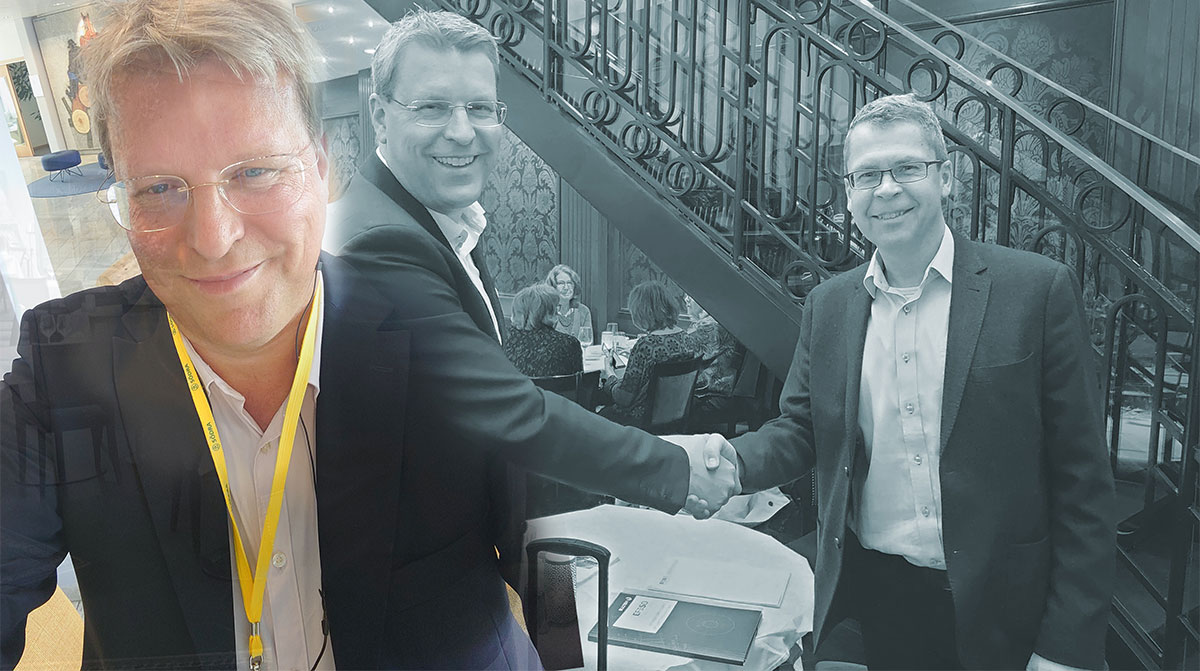TWO POLAR STARS FOR A BETTER WORLD

NORDICS
Hands-on-transformation and a unique growth practice
By Tobias Eriksson, Vice President
100 years ago, the famous Swedish Wallenberg dynasty, led by its patriarch, already had nine big companies under his hands, in turn led by nine CEOs. He gathered them in Stockholm for a meeting and gave them one order: “Spread your revenue evenly across America, Western Europe, Middle East/Africa, and Asia Pacific – within ten years, we are entering an era of globalization”. To make a long story short, they fulfilled this mission and created the global business infrastructure for one of the most successful Swedish business groups that still belongs to the global leaders in its different markets, i.e. Atlas Copco, AstraZeneca, ABB, Ericsson and Electrolux.
This characterizes to some extent, how companies in the Nordic region have been thinking since the beginning, no matter whether they are in Sweden, Norway, Finland, or Denmark. When you come from a small home market, you immediately need to expand outside of that market into other global core markets. “Speed is the mother of everything”, as Gustaf de Laval said, the inventor of the separator. This is the main reason why the Nordic market is a market today characterized by a high density of very large international companies in relation to the population. From a consulting perspective, there are two key trends on which the success story of our region will continue to depend – beyond current global political events. In addition to the challenge of sustainability, the further development of the world of digitalization work deserves special attention. Since both topics are closely interwoven, industry consulting firms that support on strategy deployment, implementation, and execution, need to stand firmly in both fields. But what does this mean?
The core of value creation sets the course for
the sustainability transformation journey.
A new era of sustainability related value creation
Today, in 2022, 100 years after the globalization paradigm shift, industrial companies are now facing the next major change, the era of sustainability, requiring a new non-volume growth-based view to value creation, transforming companies’ value chains into circular flows. In the Nordics, the UN sustainability goals are normally used as the starting point for sustainability strategies and operations in big corporations. From those goals the whole view of sustainability is derived, but furthermore there’s a clear understanding of the necessary transformation process: It’s coming firstly, from the value chain, the business model, then
the operating model, and then the operations. In that order things will shift and change. Industry consultants need to work in that order, if they want to achieve the desired results for their customers. Additionally, digitalization becomes a pivotal element or even a prerequisite for a value chain transformation that takes place going into circular economy. It is certainly an advantage that a strong sense of economic, social and environmental responsibility has been an essential part of the operating maxim of Nordic companies for generations. But in bringing together digital and sustainable transformation processes, many other qualities and competencies are required that cannot be taken for granted. Especially, if the zero-waste type of circular flows is the core target for manufacturing companies. Circular flows will go in the way that the sustainability impact is optimized or minimized. There is a fundamental shift required for upstream industrial companies if they are going to economically capitalize on the sustainability transformation, putting the end-user at the centre of the circular value chain. Only the end-user will in the end pay a premium for sustainability.
The only way to do this is through digitalization because companies need to activate all data and measurements throughout their whole circular flow and their whole value chain. So, they should have a full view on what is the total impact on if it's greenhouse gas emission, water or energy waste. And even more in other types of sustainability parameters like in social dimensions such as equality or fair trade. But to be able to create that transparency, economy – in the Nordics as well as all over the world – needs more than digitalization tools. We also need the right mindset, skills and behaviours to master this daunting transformation. And this is where the next trend come into play.
The increased importance of the human dynamics factor
Even as business processes are more and more focused on technology, the importance of the “human factor”, e.g., in leadership, collaboration, creativity will continue to be the dominant factor. The fascinating contradiction is that the more technology is advancing, the more important the human dynamics element becomes. Because every single intervention of a leader, a manager or an employee will have a bigger impact in the future. Hence, the leadership behaviour element will grow in importance. At the same time, there might be fewer human beings who work on some of the machines or processes that we’re in. Also, ethical questions come into play, especially in relation to deploying responsive systems. Just like in the healthcare domain, we will need ethical councils in industrial firms: what do we leave for the machines to decide?
An interesting contradiction in the Nordic market is that collaboration and cooperation are elements that are deeply rooted in the culture, and so the advancement in the implementation of for example Kaizen based models has been slower in the Nordic countries than in many other countries, which are, by definition, more hierarchical. In the Nordic part of the world, there's a difference in leadership and business mentality compared to other countries. Even before digitalization and sustainability came in as more progressive elements, there has always have been a strong, positive drive from the leadership and a low level of conservatism and negativism in corporate cultures, unions have been progressive.
Preparing our Nordic growth sub-practice for scaling
In consulting, we have a unique growth practice that we have built over time in the Nordics: the same logic that we apply on operations, we apply the mirrored version on growth. On the operation side, we have operational losses. On the growth side, we have opportunity losses. We work systemically to maximize the growth potential, i.e. throughout the growth lifecycle from market potential, to converting prospects to advocates, getting orders booked to sales orders and finally orders to cash. We know from experience what good growth engines look like and do our best to tune the ones out there. EFESO working as well upstream as downstream in many value chains opens up for joint value creation across the value chain.
With the same logic that we apply on operations, we apply the mirrored
version on growth, with the same robustness.

EFESO clients: our consulting focus in the Nordic countries
- The forest and packaging industry is our core. A Nordic industry which is unique in Europe. For example, we have been working with Tetra Pak for 20 years. Especially by developing their world class manufacturing together with them at 24 plant locations around the world. Beside this, we work with almost all the Nordic companies in this sector, upstream to downstream.
- We are consistently growing our footprint in other parts of the process industry, notably in food and beverage. Our expertise is in demand here to support companies on their worldwide expansion by strengthening and making their operations more agile.
- In the discrete manufacturing, world-leading players from the automotive sector and industrial equipment makers are our clients – but also their corporate allies and suppliers, which in their sub segments very often also are world leaders or number two or three.
- A heritage that we have in the Nordics is also a strong presence in infrastructure, notably energy and water companies where the strong need for developing solid future-proof maintenance capabilities is a key driver and the need for a cultural shift is big.



